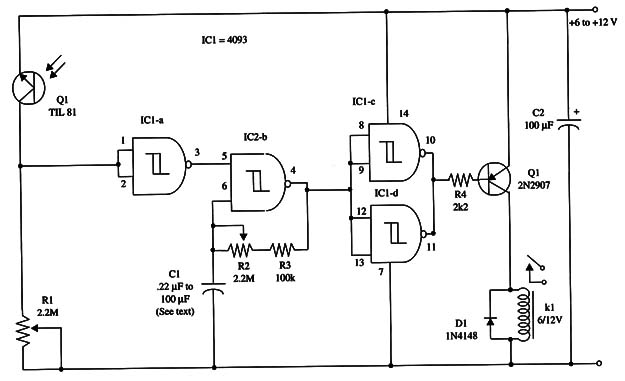In this project R1 adjusts the turn-on light level, and R2 determines the frequency of the flashes.
The lamp (or many lamps) can be controlled by the relay, but you can also use the circuit to control other loads such as appliances, motors, solenoids, and so forth.
The frequency can be altered by changing
A schematic diagram of the Dark-Activated Flasher is shown in Fig. 1.

The layout can be altered to suit the relay used. Any phototransistor can be used in this circuit.
Even a common power transistor such as the 2N3055, without its cover, can act as a sensitive phototransistor.
C1 determines the turn-on and turn-off rate as required by the intended application. See Project 124 for more information about this component.
The relay depends on the controlled load. A mini DPDT 1 A relay can be used to control small appliances and lamps up to 100 W.
IC1 - 4093 CMOS integrated circuit
Q1 - TIL81 or equivalent photo transistor
D1 - 1N4148 general purpose silicon diode
Q2 - 2N2907 PNP general purpose silicon transistor
K1 – 6 or 12 V relay (see text)
R1, R2 - 2,200,000 Ω - potentiometers
R3 - 100,000 Ω, 1/4 W, 5% resistor
R4 - 2,200 Ω, 1/4 W, 5% resistor
C1 - 0.22 µF to 100 µF ceramic, metal film, or electrolytic capacitor (see text)
C2 - 100 µF, 16 WVDC electrolytic capacitor



